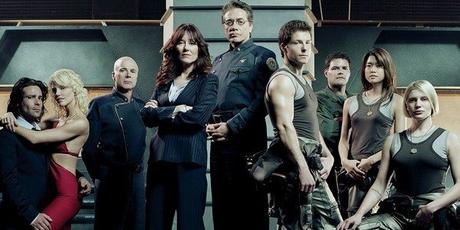
During the early days of cable television burgeoning networks were finding success catering to different niche markets. Atlanta media mogul, Ted Turner who started the whole shebang, had an empire of networks to showcase all of the TV shows, cartoons, and films he owned. Comedy Central was centered on comedic programming (duh). Nickelodeon promoted itself as the first network for kids. Others saw the promise of the cable industry and jumped in, among them was a channel founded by two entertainment lawyers Mitchell Rubenstein and Laurie Silvers. Both were huge science fiction fans and realized there were plenty more fans like them with no dedicated venue to their preferred style of entertainment. The two realized the potential success of a cable channel that would cater to fans of science fiction, fantasy and horror and made the right corporate partners to launch the Sci-fi Channel. For fans of the genre this new channel was a godsend. Kicking off with the original Star Wars, there was an embarrassment of geeky riches available. Their entire programming cycle was filled with the likes of: Star Trek, the Universal Monsters, kaiju monsters, The Twilight Zone, Amazing Stories, superheroes, The Outer Limits, aliens, Planet of the Apes, Hammer Horrors, classic films, classic TV shows, Quantum Leap, programs about real science, documentaries about the paranormal etc. They introduced mainstream American audiences to Japanese anime by screening the classic Akira and became the first American network to secure broadcasting rights for the entirety of Doctor Who. To cement their science fiction cred both Gene Rodenberry and Isaac Asimov were prominent consultants during the early stages of the channel.
While they had a wealth of archived programming to go through, the Sci-fi Channel had to eventually take the plunge and develop their own original programming. Luckily, the budget friendly series Mystery Science Theater 3000 had just ended its run on Comedy Central and was in need of a new TV home. The success of MST3K allowed the Sci-fi Channel the freedom to create more original content. The series Farscape became a cult hit that still holds influence on the genre. They picked up Stargate SG-1 from Showtime which became their flagship franchise for several years. While none of these low budget genre shows were ratings blockbusters they garnered incredibly devoted fanbases. However, in 2003 former Star Trek writer/producer Ronald D. Moore would give Syfy the miniseries, which became a regular series Battlestar Galactica which was nothing short of a game changer for the network.
Rebooting a 1978 series most known for being a cheesy Star Wars knock-off, Battlestar Galactica was an engrossing science fiction epic about the last survivors of humanity engaged in war with the robotic Cylons. With an all-star ensemble, this was a space opera that connected with a very modern audience by tackling very real and recognizable elements of our world through the lens of sci-fi. Not only did it score big ratings but Battlestar was also hailed by critics as one of the greatest shows on television. This proved there was a sizable audience for grounded and cerebral genre shows, and soon other networks jumped on the bandwagon with shows like; Lost, Heroes, Game of Thrones and The Walking Dead. In the midst of this historic run the channel rebranded itself from the Sci-fi Channel to Syfy. The corporate bosses felt with their newfound mainstream success this new name would not alienate new viewers as much as the name which proudly advertised the content they showed. Many saw this as the handwriting beginning to form on the proverbial wall as the channel tried to divorce itself from what built it. Nevertheless, Syfy, had their first bonafide hit and one would think this would be something for them to build on....but one would be very wrong.

For a while Syfy was able to ride the momentum Battlestar while building around it fun and lighter shows like Eureka as well as importing the revived Doctor Who. But there was no denying a growing trend in the industry of reality television. With their corporate overlords at NBC/Universal taking more control over Syfy they too jumped into this fad. Hopefully you can see what the natural problem is with a channel built on science FICTION airing REALITY television. Admittedly, some of this new slate of shows did build on the themes of their regular programming. The game show Face Off pitted make-up artists against each other as they competed to craft the best monsters and aliens. Syfy has never been a stranger to airing paranormal based programming so their hit Ghost Hunters did make sense in that vein. But the other reality programs they aired had little or nothing to do with genre entertainment. In a further power move by NBC/Universal, Syfy began airing professional wrestling as well as Law & Order reruns, which as you may gather has absolutely nothing to do with the science fiction, fantasy, or horror programming the fans of the channel expected.
The final nail in the Syfy coffin seemingly hit in 2013. Even though the channel had mostly become :sci-fi" in name only (or syfy as it were), they did flood the airwaves with cheap intentionally stupid monster movies often filled with B-grade (at best) actors dubbed "Syfy Original Movies". In 2013, they aired one such film that unintentionally became a cult hit for all the wrong reasons, Sharknado. While we all had a good laugh at the ridiculousness of the movie it scored the biggest ratings the channel had seen in sometime so they went to work churning out countless sequels to the TV flick. This made Sharknado and Syfy synonymous with one another, meaning that as far as the masses were concerned Syfy was merely the home of stupid movies. They have now become a joke to mainstream viewers while at the same time driving off their devoted core audience. What Syfy had ultimately achieved was failure.

In 2017, then president of Syfy Chris McCumber, proclaimed that in honor of the channel's 25 th anniversary, he was preparing a return to the channel's science fiction roots with a plan to be "fan centered". But it would seem this was all a perfect case of "too little too late". They rolled out a new slate of shows like: Krypton, The Magicians, Dark Matter, Deadly Class and Happy!. Also announced were intended adaptation of various popular sci-fi and fantasy novels, which never came to fruition. All of these shows quickly met their ends, with the exception of The Magicians and Wynona Earp, which lingered on a bit longer thanks to devoted cult followings. Even still, those shows still had to take budget cuts to survive. Had the other shows lasted longer perhaps they too could have found an audience, but as it is there is no way of knowing.
Nowadays a genre show being on Syfy seems to be more of an obstacle to overcome rather than a path to success. Critical darling The Expanse had such low ratings it was cancelled after a single season, but a move to Amazon has turned it into a cult favorite. The terrifying horror anthology Channel Zero also met a premature end on Syfy only to become an absolute fan favorite on Shudder. What was once a beacon of genre entertainment is now officially a shell of its former self. It is not even the case that the fandom for science fiction-based programming no longer exists because outside of Syfy, shows like: Stranger Things, Doctor Who, Black Lightning, Creepshow, Umbrella Academy, The Witcher, The Chilling Adventures of Sabrina and so many more are finding great success. In the case of Doctor Who, they actually did have control over it, but gave it up to BBC America who successfully turned Who into their flagship show, another example of Syfy not realizing what they had. By becoming a channel which neglected its core purpose in favor of stupid "original movies" and reality TV they drove away their once devoted fans who they have so far been unsuccessful in getting back. Even now when they do stumble upon a good show, they are notorious for quickly cancelling them before they get a shot at building a fanbase. This means viewers are incredibly hesitant about watching anything they produce. The rise of streaming also presents a challenge as the cable industry as a whole needs to find a way survive and evolve in the face of a new television landscape.

